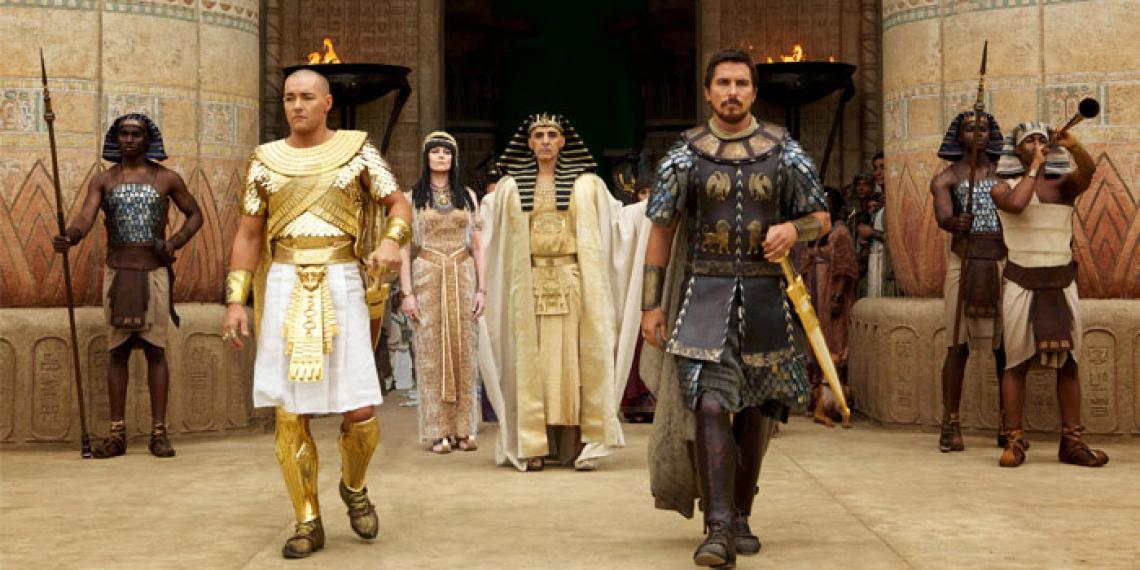You are here
Film Review - Exodus: Gods and Kings

Gladiator director Ridley Scott brings us the latest in a series of biblically inspired films, with Christian Bale starring as Moses.
Raised as a brother to Pharaoh-in-waiting Ramses, Moses has no idea he is himself Hebrew, a people enslaved by the Egyptians. Despite fighting shoulder-to-shoulder with Ramses, the pair find themselves at odds after a battlefield prophecy comes to pass. Eventually, Moses finds himself banished after the conniving Hegep informs Ramses, now Pharaoh, of his true lineage.
Returning to Egypt years later, Moses tries to convince the Pharaoh to free the Hebrew people, but Ramses' refusal and cruel response unleashes the wrath of God upon the land.
Unsurprisingly, as this is a Ridley Scott film, this is a visual feast. There are some absolutely breath-taking shots and the set pieces, especially the plagues, are done with relish.
However, Scott strays from the scriptures, making some huge deviations for artistic effect, which leaves the movie somewhat lacking. He gives Moses a handy head injury to initiate a conversion experience. When Moses speaks with God, it's clear that everyone else just sees Moses speaking to himself. A naturalistic counter-narrative is offered to the miraculous plagues, and even the parting of the Red Sea coincides with a meteor strike and a resulting tsunami.
It’s hard to know whether Scott is looking for an escape route to placate atheist critics, or avoid the truth of the miraculous interventions of God and their implications.
Overall Exodus tends to focus not on the Bible's spiritual battle between the all-glorious sovereign God and Pharaoh with his impotent gods, but the fight between two very intense men, Moses and Ramses. Given that artistic license has been taken to create the central relationship of the film—between Moses and Ramses, very little in the story reflects the biblical account of Moses' God-directed interactions with Pharaoh.
Another controversial thing is Scott’s decision to portray God’s mouthpiece as a young boy called Malak (11-year-old British actor Isaac Andrews), who is only visible to Moses.
But it seems that Andrews has been asked to portray God as moody, malevolent and mischievous. Scott has definitely made his God character fickle and erratic. This is seen clearly in Scott's handling of one of the most difficult passages in the Bible: God's decision to make the last of the ten plagues the killing of the first born son in every Egyptian household. There is an angry shouting match between Moses and God. Moses argues that this is barbaric revenge and says he will have no part in it. The events of the Passover are thus portrayed as a bad decision made by a stroppy child.
But Scott has also desentimentalised a relationship with God. Too often movies have portrayed spirituality as some kind of ecstatic state of perpetual serenity. Scott has read enough of the book of Exodus and the Psalms to know that a relationship with God can be loud and argumentative. And he seems to understand that God doesn't have to fit our expectations or traditions
Though it would have benefitted from a bit more quiet reflection and character development amidst the big-budget battles and CGI spectacle, on the whole Exodus has compelling characters and good acting. Both Bale and Joel Edgerton (Ramses) are excellent and there is an excellent supporting cast including Sigourney Weaver, John Turturro, and Ben Kingsley.
It needs to be said that Exodus: Gods and Kings is by no means a perfect film. But it’s a solid film with exceptional devotion to craft and its miles better than the terrible Noah. And if you want a movie that will stir discussion on the nature of God’s sovereignty and power, then Exodus is worth watching.
Review by Martin Barratt
Exodus: Gods and Kings
Genre: Drama/Action
Director: Ridley Scott
Rating: M (violence)
Run time: 2 hr 30 mins